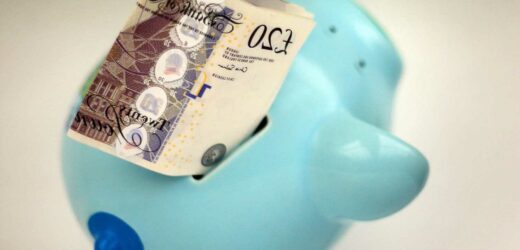THE Bank of England could raise interest rates before Christmas because of soaring energy bills.
The central bank can increase what's known as the base rate, which is currently at a record low of 0.1%.
The base rate is used by high street banks to set their own rates for loans, mortgages and savings rates.
By increasing the base rate, the Bank of England (BoE) hopes it can keep a handle on the rising costs of goods – known as inflation.
Inflation is currently at 3.2% and could rise to 4% by the end of the year – way above the BoE's target for inflation of 2%.
BoE governor Andrew Bailey has warned that it will "have to act" to curb rising inflation, signalling a rate rise is likely on its way.
The Bank of England's (BOE) monetary policy committee votes regularly on what the base rate should be.
The next meeting is on November 4, and if there is a rate rise it will be announced at around midday on that date.
Laura Suter, head of personal finance at AJ Bell, said: "It’s now widely expected by economists and investors that a rate rise is on the horizon, with expectations of an increase from 0.1% to 0.25% this year and another nudge up to 0.5% next year."
A rise to 0.25% would be a return to pre-pandemic rates. The BoE slashed rates down to 0.1% in March 2020 when coronavirus first hit in an effort to boost the economy.
But a rate rise would come "at the worst possible time" for many households, said Suter, coming hand-in-hand with increasing household bills and a squeeze on finances this winter.
She said: "While rates will edge up, rather than leap overnight, any shift higher may be the match in the powder barrel for some families."
If banks and building societies pass the rate rise on to consumers, it could be bad news for borrowers, including homeowners, who may see interest rates on loans rise.
But it means savers could also see the amount paid on their nest eggs increase.
What does a rate rise mean for my mortgage?
Those on tracker and variable rate mortgages will feel the effect on bills as soon as their bank increases the rate in line with the base rate.
Fortunately, those on a fixed-rate deal won't feel the rise until their deal comes to an end and they take out a new one.
Suter said: "Mortgage providers don’t hang around when it comes to passing on rate rises, so anyone on a tracker deal will see their costs go up immediately.
"If 0.5 percentage points is added to mortgage interest it adds about £50 a month to the cost of a £200,000, 25-year mortgage, or around £120 a month extra to a £450,000, 25-year mortgage."
Anyone on a fixed-rate deal will be protected from any increases, she added: "However, those nearing the end of their deal may find rates have got much higher when they come to re-mortgage."
One helping hand for homeowners is that property prices have increased.
That means when you come to re-mortgage, the loan-to-value (the proportion of your property's value that you borrow) will likely have improved.
That should mean access to better mortgages deals and could bring smaller monthly repayments.
What does an interest rate rise mean for my debts and for borrowing money?
The cost of borrowing through loans, credit cards and overdrafts could go up too, as banks are likely to pass on the increased rate.
Sarah Coles, personal finance expert at Hargreaves Lansdown, said: "This piles on more misery for anyone with significant debts, who now has to add the rising cost of interest payments to their increasingly overstretched budgets."
Certain loans you already have like a personal loan or car financing will usually stay the same, as you've already agreed the rate.
But rates for any future loan could be higher, and lenders could increase the rate on credit cards and overdrafts – although they must let you know beforehand.
You can cancel a credit card if you want, and will have 60 days to pay off any outstanding balance.
Suter said that average interest rates on personal loans are already at their highest rate since March last year at 5.85%.
Average overdraft interest rates are 20.35%. and on credit cards it's 18%, but many people will be paying much more than this, she added.
“Anyone with debt should look at moving it to a cheaper rate and locking that in ahead of any rate rise.
"There are a number of long 0% balance transfer deals available at the moment for those in the red on their credit card: Santander, M&S Bank, Natwest and Sainsbury’s Bank are all offering more than 20 months interest-free.
What does an interest rate rise mean for my savings?
A rate rise could be good news for savers after a long stretch of getting very low rates on their money.
Along with low rates, high inflation can erode away the value of any savings you have.
So if you have £100 in the bank this year and inflation is 4%, the real spending power of that money is reduced to £96 next year
Brits currently have around £240billion stashed away in accounts paying no interest at all.
A rate rise could see banks pass on higher rates too savers – though they are usually much slower to act than with passing on higher rates for borrowing.
This means savings rates are more likely to edge up slowly rather than change immediately.
Suter said: "Anyone considering putting their money into a fixed rate account now needs to think carefully about what they think rates will do in the near future.
"Any increase in the base rate will translate into higher rates in the fixed-term market, so savers might want to wait to see how that plays out before they lock their money up for a long period."
Anyone currently getting a low rate on easy access savings could find it's worth looking around for a better rate after any rate rise and moving their money.
We pay for your stories!
Do you have a story for The Sun Online Money team?
Email us at [email protected]
Source: Read Full Article



